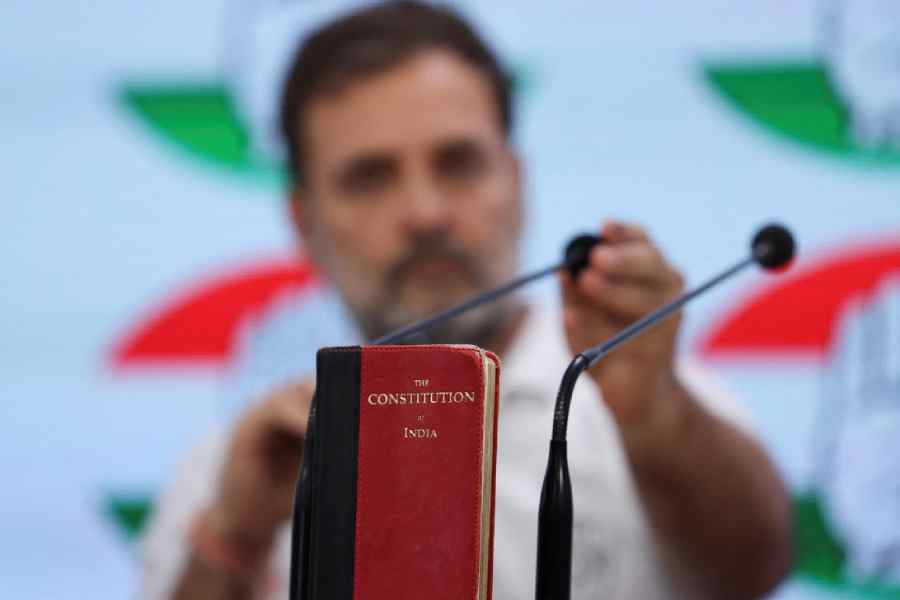Prime Minister Narendra Modi took his oath of office on June 9, Sunday, swearing true faith and allegiance to the Constitution of India. What his faith and allegiance to the Constitution actually entail became a bone of contention in this election campaign. A testament to the centrality of the Constitution was the sight of Rahul Gandhi holding up a pocketbook copy of it in the INDIA bloc’s first press conference after the results were announced. The campaign had been a “fight to save the Constitution” he declared and congratulated all those who had fought and won. That the Constitution has won the day has been a common refrain since. But what does it mean for the Constitution to win?
Symbolically, the Constitution won in two distinct ways. First, it became a topic of everyday conversation in a way it has rarely been in independent India. The Constitution, the longest of any country, written in dense legalese, has always remained a somewhat abstract thing. Engagement with its concepts — like liberty, equality and fraternity — was left to courts, its promises — special measures for backward classes, temple entry for all — mostly the stuff of political rhetoric. Apart from a brief period during the Emergency and the Janata Party government that followed, it has never been perceived by ordinary citizens as shaping everyday life in India.
But over the course of the last two months, the Constitution came alive. During my travels, from Manipur to Mumbai, it became clear that voters were struck by concern that a landslide majority for the ruling Bharatiya Janata Party may lead to an upending of their everyday lives and opportunities. While this was a vague apprehension in the beginning, by the end of the campaign it had morphed into a distinctly articulated fear — that the BJP would fundamentally alter tribe and caste-based reservations promised by the Constitution.
With the public narrative being set in these terms early in the campaign, both sides, the government and the Opposition, tried to outdo each other in declaring their fidelity to the Constitution. This was not in the form of a constitutional debate about the merits of caste-based versus economic criteria-based reservations. Indian elections have rarely turned on such policy questions with deep ideological roots. Neither did this one. Instead, it was a dog-and-the-bone style contest to claim the constitutional handkerchief. The Constitution won because its moral force was plain for all to see.
Substantively, the election results were more directly a victory for the people, rather than the Constitution itself, which was reinforced as a result. The lessons from this mandate are many. But a headline that has emerged is that a mighty, majority government has now been forced to be accommodative to stay on in power. This is a classic case of a popular belief in checks and balances — that if the people in power are forced to work with people they would rather not work with, decisive outcomes will follow. India’s liberalisation came from such a government, as did the nuclear tests in Pokhran. The 2024 mandate is a pause button on baahubali politics and a return to the coalition era that preceded it. The way the NDA 3.0 government has taken shape now — with a majority of BJP ministers holding plum ministries — may appear to belie this belief. But the vagaries of coalition politics — compromise and conciliation — will soon become clear for all to see.
The ideas of such coalition governments, and checks and balances more broadly, were not core to the framing of the Indian Constitution. Quite to the contrary, the Constitution creates a mighty government, untrammelled by too many internal checks, from the judiciary or the legislature, or external ones, like referendum or recall by citizens. It was written at a time when a majority government was inevitable and was designed to equip it with the powers necessary to deliver change. The people’s mandate this time — accommodate others or perish — is a triumph of electoral democracy.
Equally, it is a triumph of the Indian federal set-up. The Constitution creates a federation but then vests a whole range of powers in the Union government that makes it all-powerful. The last 10 years of non-coalition governments meant that this constitutional vision was serviced by the ‘One Nation, One X’ range of programmes. Whether that is desirable or not is a distinct matter and depends on what X might be. But as a philosophy, it is homogenising, often unable or unwilling to recognise India’s greatest source of uniqueness — its diversity.
A key takeaway of the 2024 mandate is that the four most politically significant states in national politics in terms of seats if not importance, in the North, South, East and West — Uttar Pradesh, Tamil Nadu, West Bengal and Maharashtra — have voted decisively against the incumbent government in New Delhi. The message is loud and clear from four wings of the country — India is one, but its oneness should not be mistaken for sameness.
The Constitution wins when its values of justice, liberty, equality and fraternity win. The election results are an expression of free popular will, a contest about what it means to be equal, a renewed commitment to secure justice for historic wrongs, and a clear message that fraternity is not the same thing as uniformity. Prime Minister Modi and his NDA government are the people’s choice to deliver on this mandate. But this time, when they ascended the steps of Rashtrapati Bhavan to take their oath of office, the values of the Constitution reinforced authoritatively by the voters perhaps rang a little more loudly in their ears. Only time will tell how it shapes their decisions.
Arghya Sengupta is Research Director, Vidhi Centre for Legal Policy. Views are personal











